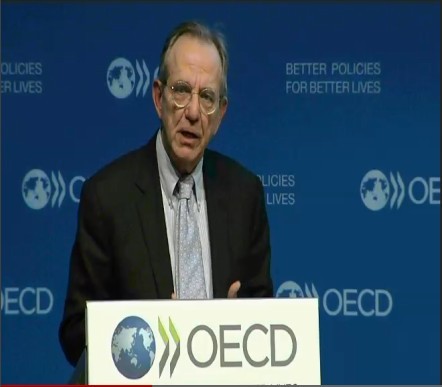Moderate recovery seen in advanced economies, says OECD

Pierre Carlo Padoan, OECD Deputy Secretary-General and Chief Economist presenting the Interim Economic Assessment in Paris /OECD
On March 28th, the OECD released its Interim Economic Assessment in Paris. Titled “What is the near-term global economic outlook”, the assessment answers its interrogative heading with a measured degree of optimism. “The global economy is now picking up in many major economies,” However “In Europe, a meaningful recovery is likely to take somewhat longer.”
The assessment analyzes that G7 economies will grow 2.4% in the first quarter of 2013 and 1.8% in the second quarter of 2013. With the support of new policy measures, moderate growth can be expected in the United States, while Japan is anticipated to see acceleration from low growth rates.
Within the euro area, Germany will experience relatively strength, at an expected rate of 2.3% in the first quarter of 2013 and 2.6% in the second quarter of 2013; other countries’ economices are expected to remain weak, with slow or even negative growth.
The assessment also points out that emerging economies will continue to outpace G7 economies growth and act as the driving force for the global economy in 2013. “Annualized growth in China is expected to continue to be well above 8% in the first half of 2013,”
The global economy weakened in late 2012 but the outlook is now improving for OECD economies, said Pierre Carlo Padoan, OECD Deputy Secretary-General and Chief Economist in his presentation, according to OECD press release.“Bold policy action remains necessary to ensure a more sustainable recovery, particularly in the euro area, where growth is uneven and remains slower than in other regions”.
Monetary stimulus and fiscal consolidation remain necessary, the assessment advises. Although in some economies, channels for the transmission of monetary easing to the real economy are impaired, low inflation rates provide some room for further monetary policy action.
“In the United States, the commitment of the Federal Reserve to keep policy rates low until labor market outcomes improve substantially is well judged, but the need for further exceptional monetary measures is waning, while in Japan more aggressive policy action is required to escape deflation and achieve the Bank of Japan’s new 2% inflation target,” Mr Padoan said.
While Growth in the euro area continues to be weak, progress toward rebalancing of the economy is being made, the assessment says. “Structural reforms, notably in Greece, Ireland, Italy, Portugal and Spain, provided a solid base for a recovery in competitiveness and an increase in employment when demand turns around.”
Since 2003, the OECD has presented an interim assessment between each issue its Economic Outlook. These provide updated information to evaluate whether the latest Economic Outlook projections are still on track for the larger economies.
